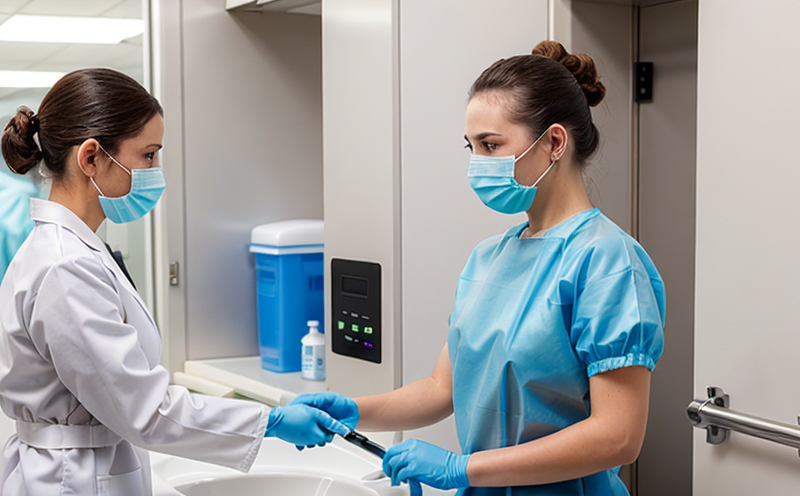Antimicrobial efficiency of smart textile applications
The development and application of antimicrobial textiles have grown exponentially in recent years. These textiles are designed to provide protection against harmful bacteria, fungi, and other microorganisms, making them ideal for a wide range of sectors including healthcare, sports, and personal care. Smart textiles incorporate advanced materials that not only enhance the functional properties but also offer enhanced performance through technology integration.
Our laboratory specializes in evaluating the antimicrobial efficiency of smart textile applications using rigorous testing methodologies aligned with international standards such as ISO 20743:2016, ASTM E2846-19, and EN 16500. The aim is to ensure that these textiles meet stringent hygiene and safety requirements without compromising on comfort or aesthetics.
Our testing process begins with thorough specimen preparation, which includes selecting the appropriate materials based on their intended use and ensuring they are free from contamination. Specimens undergo various treatments designed to simulate real-world conditions, such as washing cycles and exposure to environmental factors that might affect their antimicrobial properties over time.
The testing apparatus used is state-of-the-art, capable of simulating diverse scenarios relevant to the end users' environments. For instance, we employ specialized chambers that replicate hospital or sports facility settings to assess how effectively the textiles perform under these conditions. We also use sophisticated microbiological analysis techniques to determine the efficacy of the antimicrobial treatments.
Our testing methods are comprehensive and cover multiple aspects including initial bacterial load reduction, continuous microbial growth inhibition during normal wear periods, and long-term durability against repeated washings. This ensures that our clients receive accurate and reliable data which can be used confidently for regulatory compliance or internal quality control purposes.
- Initial Bacterial Load Reduction: We measure the decrease in colony-forming units (CFUs) of targeted bacteria before and after treatment to assess immediate effectiveness.
- Continuous Growth Inhibition: This involves monitoring bacterial growth over extended periods under controlled conditions to evaluate sustained performance.
- Wash Durability Testing: Samples are subjected to multiple washing cycles to determine the longevity of the antimicrobial properties.
In addition to these core tests, we offer additional services such as surface modification analysis and material compatibility assessments. Surface modification can enhance or alter the inherent properties of textiles further, while ensuring that modifications do not adversely affect their overall quality or functionality is crucial for successful product development.
Our team consists of experienced professionals who understand both the technical aspects of textile manufacturing and the regulatory landscape surrounding hygiene products. By leveraging this expertise, we provide tailored solutions to meet specific client needs across various industries.
To sum up, our antimicrobial efficiency testing service is designed to give you peace of mind knowing that your smart textiles will not only perform well but also comply with relevant standards and regulations globally.
Benefits
The benefits of conducting comprehensive antimicrobial efficiency tests on smart textile applications extend beyond mere compliance. Here are some key advantages:
- Increased Consumer Confidence: By demonstrating that your products meet stringent hygiene standards, you can build trust with consumers who demand safe and effective products.
- Enhanced Product Differentiation: In competitive markets, offering superior hygiene features can set your product apart from competitors, attracting a more discerning customer base.
- Regulatory Compliance: Adhering to international standards helps ensure that your products are acceptable in different regions around the world, reducing the risk of non-compliance penalties.
- Prolonged Product Lifespan: Our tests help identify potential weaknesses early on, allowing for improvements during the design phase and extending product longevity.
- Better Consumer Health Outcomes: Ensuring high levels of hygiene reduces the risk of infections or allergic reactions among users, contributing positively to public health.
These benefits not only enhance your brand reputation but also contribute significantly towards achieving business goals related to innovation and sustainability.
Quality and Reliability Assurance
- Consistent Test Results: Our laboratories employ standardized procedures ensuring consistent results across different batches or samples. This consistency is crucial for maintaining product quality standards over time.
- Accurate Reporting: Comprehensive reports are provided detailing all aspects of the test, including any deviations from expected outcomes and recommendations for improvement where necessary.
- Trained Personnel: Our staff undergo regular training to stay updated with the latest technological advancements and best practices in textile testing.
- State-of-the-Art Equipment: Equipped with top-tier equipment, our labs can perform precise measurements essential for accurate assessments of antimicrobial efficiency.
In addition to these technical measures, we maintain strict quality control protocols throughout the entire process from sample receipt through final report generation. This ensures that every step contributes towards delivering reliable and repeatable results.
Competitive Advantage and Market Impact
Incorporating advanced antimicrobial features into textiles offers significant competitive advantages in today’s market. Consumers increasingly prioritize health and safety when purchasing products, making it essential for businesses to stay ahead of this trend by offering superior hygiene solutions.
By investing in robust testing and development processes focused on enhancing microbial resistance within textiles, companies can differentiate themselves from competitors who may not offer similar levels of protection or reliability. This strategic approach helps maintain market leadership while fostering innovation within the industry.
The demand for antimicrobial textiles continues to grow across various sectors including healthcare facilities where cleanliness is paramount, sports equipment designed to prevent infections among athletes, and personal care products aimed at maintaining hygiene standards during everyday use.
Our expertise in this area allows us to assist brands in developing innovative products that cater specifically to these needs. Through close collaboration with R&D teams, we help identify opportunities for improvement and develop strategies that align with broader business objectives such as sustainability initiatives or expanding into new markets.





